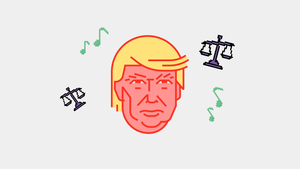The Isaac Hayes estate’s copyright lawsuit against Donald Trump - in relation to the use of Hayes’ song ‘Hold On, I’m Comin’ at the President’s rallies - can proceed, a judge has ruled. However, additional claims made by the estate over publicity rights and allegations of false endorsement have been dismissed.
Indeed, the judge said that the estate’s argument that Trump simply using Hayes' song at his rallies constituted false endorsement under US trademark law was “senseless”. Because - if that was the case - whenever public figures, or indeed companies, secure copyright licences to make use of music, they could be at risk of false endorsement claims being subsequently made by a songwriter.
The judge’s conclusion basically means that any artists annoyed at politicians for using their music at events without bespoke permission will have to rely on copyright law if they want to make a legal claim. Which puts the blanket licences issued by the music industry’s collecting societies back in the spotlight.
The BMI blanket is central to this dispute because Trump’s campaign had a licence from the collecting society, which represents both Hayes and his co-writer on ‘Hold On, I’m Comin’, David Porter. Which means that when Trump started using the song in 2020, in copyright terms he was arguably covered by that licence.
However, BMI members can exclude their songs from the licences the society issues to political campaigns, which both Porter and the Hayes estate did last summer, just as Trump was going into full-on election campaign mode. And despite that fact, ‘Hold On, I’m Comin' continued to be played at the President’s rallies.
Trump hoped to get the estate’s copyright claims dismissed via a technicality in relation to ownership. Warner Chappell previously owned the copyright in the song, but the estate exercised Hayes’ termination right under American copyright law a few years back.
As a result ownership reverted to the estate and was then transferred to Hayes Enterprises, the company run by Hayes’ son Isaac Hayes III, which filed the lawsuit against the President.
The Trump team argued that the termination hadn’t been properly completed, and that the subsequent transfer of ownership to Hayes Enterprises hadn’t been properly proven, and therefore the case should be dismissed. However, the judge concluded that the estate’s paperwork in relation to termination and ownership were satisfactory for the case against Trump to proceed.
The separate allegations that Trump’s use of Hayes’ song constitutes false endorsement under US trademark law - and also infringed Hayes publicity rights under Georgia state law - would have allowed the estate to make a legal claim even if the BMI licence covered things on the copyright side.
But the judge rejected both those allegations. The estate “point to the fact that they have alleged owning a trademark in the songwriter’s name”, the judge wrote in his judgement, but “they never allege” that Trump
“used the songwriter’s name at any point in time”. They allege “nothing more than the appropriation of the composition itself”, he added, which “is not enough to plausibly state a claim for false endorsement”.
In terms of the publicity rights claim, the judge explains that in Georgia, “the right to publicity is violated when there is an appropriation of a public figure’s name or likeness for the defendant’s benefit without consent”. But because Trump didn’t directly use Hayes’ name, that didn’t happen either.
The judge also dismissed a separate copyright claim made against right wing youth organisation Turning Point, which hosted some of the events where Trump used ‘Hold On, I’m Comin’.
Despite being the host of those events, Turning Point can’t be held liable for even contributory copyright infringement, the judge concluded, because it didn’t “provide defendant Trump with the work, encourage him to use the work, or play any role in the selection of the work”.
All of which means it’s just the copyright claim against Trump and his campaign that now proceeds.

